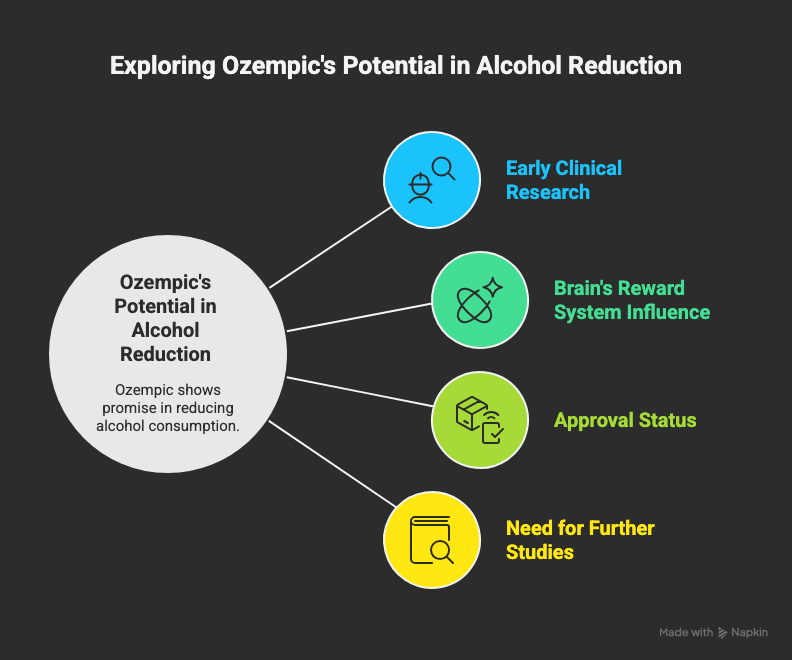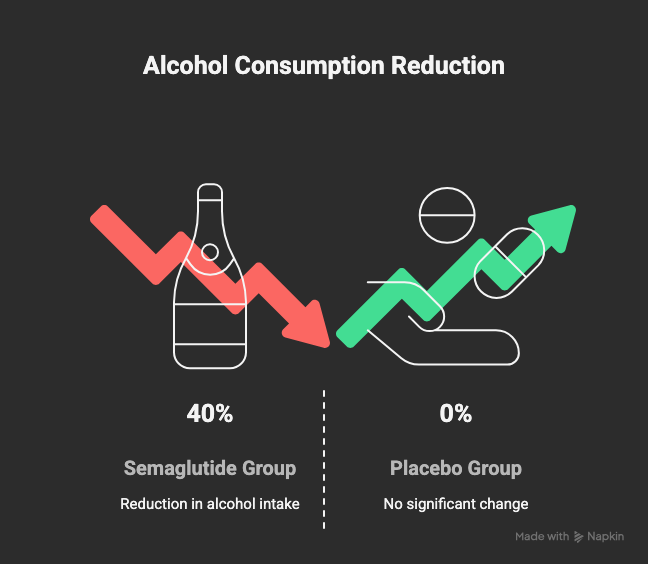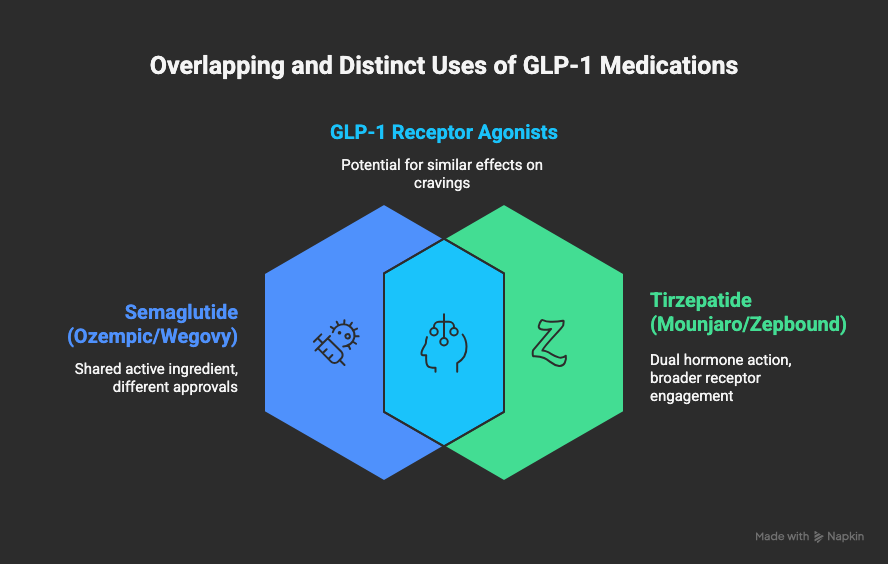Key Highlights
- Ozempic, a medication for diabetes and weight loss, is showing potential in reducing alcohol consumption.
- Early clinical research suggests users may experience a significant drop in how much alcohol they drink and have fewer cravings.
- The drug may work by influencing the brain’s reward system, which is linked to addictive behaviors.
- While promising, Ozempic is not yet approved for treating alcohol use disorder, and more studies are needed.
- Experts are cautiously optimistic but emphasize the need for larger, longer trials to confirm these effects.

Introduction
Have you heard about the surprising side effect some Ozempic users are reporting? Beyond its known uses for diabetes and weight management, many people have noticed a decreased desire to drink alcohol. This has sparked curiosity among both users and researchers. Is there a real connection between this popular medication and reduced alcohol consumption? This article explores the emerging evidence, from personal stories to the first clinical trials, examining how Ozempic might be influencing alcohol use and what it could mean for the future of addiction science.
Understanding Ozempic and Its Approved Uses
Before looking at its effects on alcohol intake, it’s important to understand what Ozempic is and why it’s prescribed. This prescription medication has become widely known for its role in managing blood sugar and aiding weight loss. Its primary function is to help your body regulate insulin production.
However, its impact isn’t limited to just that. The way it works in the body is complex and seems to affect more than just appetite for food. Let’s explore the specifics of how this drug functions and its approved uses in medicine.
Clinical Research and Recent Studies on Ozempic and Drinking Behaviors
The first small clinical trial has provided concrete evidence supporting the idea that Ozempic can lower alcohol intake. The study involved 48 individuals with signs of alcohol-use disorder who were not actively seeking treatment. For nine weeks, one group received low doses of semaglutide, while the other was given a placebo.
The results from this initial trial, conducted at the University of North Carolina-Chapel Hill School of Medicine and funded by the National Institute on Alcohol Abuse and Alcoholism, are compelling. Participants taking semaglutide showed significant reductions in their drinking habits compared to the placebo group. These animal studies and real-world data analyses are now backed by controlled human research, marking a pivotal step in understanding the drug’s potential for treating substance use.
|
Study Component |
Semaglutide Group |
Placebo Group |
|---|---|---|
|
Treatment |
Weekly low-dose injections of semaglutide (Ozempic) |
Weekly injections of a placebo (no active drug) |
|
Duration |
9 weeks |
9 weeks |
|
Primary Outcome |
Drank about 40% less alcohol in a lab setting |
No significant change in alcohol consumption |
|
Other Findings |
Fewer drinks per day, fewer heavy drinking days |
No significant changes |
|
Cravings |
Reported reduced cravings for alcohol |
No significant change in cravings |

Key Findings: How Ozempic May Reduce Cravings for Alcohol
The recent clinical research offers a first look into how Ozempic helps reduce cravings for alcohol. The study’s findings suggest the medication does more than just affect appetite for food; it appears to dampen the desire for alcohol as well. Participants who took semaglutide didn’t just drink less alcohol; they also thought about it less.
This is a critical insight, as an intense alcohol craving can be a major barrier for individuals trying to reduce their consumption. The research indicates that Ozempic may interfere with the rewarding feeling alcohol provides, making it less appealing. This could be a game-changer for those struggling with alcohol addiction.
The key takeaways from the study include:
- A significant reduction in the total amount of alcohol consumed.
- Fewer reported heavy drinking days.
- A noticeable decrease in alcohol cravings.
- The medicine did not seem to affect how many days a week people drank, but when they did drink, they drank less.
Practical Considerations and Expert Perspectives
While the initial findings are exciting, it’s crucial to listen to what experts in the field are saying. Doctors and researchers are approaching this topic with cautious optimism. They stress that while the potential is there, Ozempic is not yet a proven treatment for alcohol use disorder.
There are many practical questions to consider, such as appropriate dosage, potential side effects, and how it compares to similar drugs. Understanding the perspectives of leading scientists helps provide a balanced view of where this research currently stands and where it might be headed.
Comparing Ozempic to Other Weight Loss Medications Like Wegovy
When discussing Ozempic, you might also hear about similar drugs like Wegovy and Mounjaro. It’s helpful to understand how they relate to each other. Ozempic and Wegovy are actually brand names for the same active ingredient: semaglutide. They are just approved and dosed differently.
Wegovy is specifically approved for weight loss, while Ozempic is for diabetes. Because they contain the same drug, it’s expected that Wegovy would have a similar effect on alcohol consumption. Another major drug in this class is tirzepatide, sold as Mounjaro and Zepbound. It works on both GLP-1 and another hormone receptor, GIP.
How these drugs compare:
- Ozempic: Contains semaglutide, approved for type 2 diabetes.
- Wegovy: Contains semaglutide, approved for weight loss.
- Tirzepatide (Mounjaro/Zepbound): A similar drug that also shows potential for reducing cravings.
- All are GLP-1 receptor agonists, suggesting they may share the effect of reduced alcohol cravings.

Conclusion
In summary, Ozempic shows promise not only in managing diabetes and weight but also in potentially reducing alcohol consumption. With its ability to influence cravings and the brain’s reward system, it opens up new avenues for individuals struggling with alcohol use. The insights from recent studies provide a deeper understanding of how GLP-1 receptor agonists can play a role in craving control. As always, it’s crucial to consult with healthcare professionals for personalized advice and to discuss any risks or side effects. If you’re curious about how Ozempic could benefit you or someone you know, don’t hesitate to reach out for a free consultation to explore your options further.
Frequently Asked Questions
Are there risks or side effects when using Ozempic to address alcohol use?
Yes, there are risks. Both Ozempic and alcohol can lower your blood sugar, potentially leading to hypoglycemia. Mixing them can also worsen common Ozempic side effects like nausea and vomiting. Both also carry a risk of pancreatitis, a serious condition. Always consult your doctor before drinking alcohol while on this medication.
Can Ozempic be prescribed specifically for treating alcohol dependence?
No, Ozempic is not currently approved by the FDA for the treatment of alcohol use disorder or alcohol dependence. While research is promising, it is only approved for type 2 diabetes and used off-label for weight management. Prescribing it for alcohol dependence would be an off-label use that lacks sufficient clinical evidence.
How quickly might someone see changes in their alcohol cravings after starting Ozempic?
The timeline for changes in alcohol cravings can vary. In one clinical trial, the effects on alcohol consumption were largest at the end of the nine-week study period. Expert opinions and patient anecdotes suggest some people notice changes sooner, but more research is needed to establish a clear timeframe.


